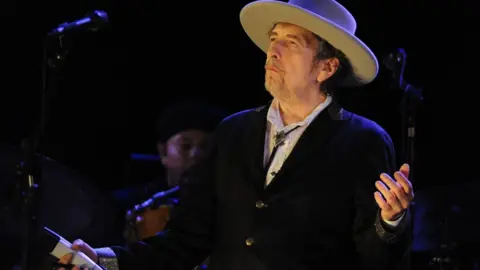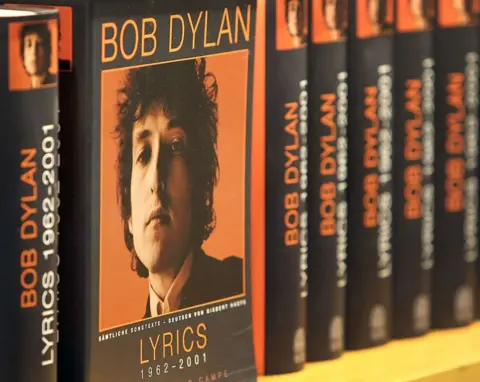Did Bob Dylan plagiarise his Nobel speech?
 AFP / Getty Images
AFP / Getty ImagesBob Dylan may have plagiarised his Nobel Prize lecture from SparkNotes, an online version of CliffsNotes, it has been claimed.
Slate Magazine uncovered similarities between the site's entry on Moby-Dick and Dylan's speech, in which he discussed the three books that had the biggest impact on his career.
The investigation was prompted by the discovery that the musician had quoted a passage which does not appear in any current editions of Herman Melville's novel.
Dylan quoted a Quaker priest who, in the aftermath of a storm at sea, tells another character: "Some men who receive injuries are led to God, others are led to bitterness."
Writer Ben Greenman observed the line did not appear in Melville's novel, suggesting Dylan may have misremembered the book.
However, Slate discovered that SparkNotes used similar phrasing, describing the preacher as "someone whose trials have led him toward God rather than bitterness".
 Getty Images
Getty ImagesIt then noted 19 further similarities between Dylan's description of Moby-Dick and the summary on SparkNotes, including:
Dylan: "There's a crazy prophet, Gabriel, on one of the vessels, and he predicts Ahab's doom."
SparkNotes: "One of the ships ... carries Gabriel, a crazed prophet who predicts doom."
Dylan: "Captain Boomer - he lost an arm to Moby. But... he's happy to have survived. He can't accept Ahab's lust for vengeance."
SparkNotes: "Captain Boomer has lost an arm in an encounter with Moby Dick... Boomer, happy simply to have survived his encounter, cannot understand Ahab's lust for vengeance."
Dylan: "He calls Moby the emperor, sees him as the embodiment of evil."
SparkNotes: "He sees this whale as the embodiment of evil."
In each of these cases, the key phrases ("predicts doom"; "lust for vengeance"; "embodiment of evil") do not appear in Melville's original text.
Representatives for Dylan and the Nobel Prize Committee have yet to respond to a request for comment.
The musician won the the Nobel Prize for literature in October and had until 10 June to deliver his lecture or forfeit the prize money of 8m krona ($900,000, £727,000).
He delivered the speech in the form of a beat poem, recited over a meandering piano, just before the deadline on 4 June - raising the delicious prospect that, like any teenager in a band, he cribbed his homework off the internet in a last-minute panic.
But this is not the first time Dylan has been accused of copying someone else's work.
He poached some stanzas from 19th-Century Confederate poet Henry Timrod for Modern Times; while some of the lyrics on his 2001 album Love and Theft were allegedly based on Junichi Saga's book Confessions of a Yakuza.
'Master thief'
In June 2009, Christie's of New York auctioned one of his earliest handwritten poems, Little Buddy, which had been submitted to his summer camp newspaper in 1957.
But eagle-eyed historians spotted that the poem was a thinly-veiled rewrite of a Hank Snow song, also called Little Buddy.
And, earlier this year, a British photographer spotted an uncanny similarity between his shot of Blackpool Pier and one of Dylan's paintings, which purports to show Norfolk, Virginia.
The musician has defended his interpolation of other people's work as being part of the folk tradition, paying homage to the artists who came before, and re-contextualising their work for a modern audience.
"If I was a master thief, perhaps I'd rob them," he sang on Positively 4th Street; while, in a 2012 interview with Rolling Stone magazine, he defended himself against accusations of plagiarism on Love and Theft.
"I'm working within my art form," he said. "It's that simple. I work within the rules and limitations of it. There are authoritarian figures that can explain that kind of art form better to you than I can. It's called songwriting. It has to do with melody and rhythm, and then after that, anything goes.
"You make everything yours. We all do it."

Follow us on Facebook, on Twitter @BBCNewsEnts, or on Instagram at bbcnewsents. If you have a story suggestion email [email protected].

